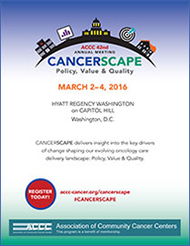CANCERSCAPE Session to Demystify Site-Neutral Payment Policy
By Amanda Patton, ACCC Communications
 In recent months MedPAC, the Centers for Medicare & Medicaid Services (CMS), Congress, and the GAO have ramped up attention on the impact of consolidation and integration, shifts in sites of service, and how unequal payment rates across settings of care are affecting Medicare costs.
In recent months MedPAC, the Centers for Medicare & Medicaid Services (CMS), Congress, and the GAO have ramped up attention on the impact of consolidation and integration, shifts in sites of service, and how unequal payment rates across settings of care are affecting Medicare costs.
Adding to the controversy (and confusion) around site-neutral payment as a solution to reducing the Medicare “spend” is the recently passed Bipartisan Budget Act of 2015 at Section 603, “Treatment of Off-Campus Outpatient Departments of a Provider.”
Although the issues surrounding site neutral payment policy are complex, “Section 603 is pretty straight forward,” says Ronald Barkley, MS, JD, of the CCBD Group. “It’s the downstream unintended consequences that cancer programs need to understand.” In a session at the upcoming ACCC Annual National meeting in Washington, D.C., March 2-4, Barkley will demystify site neutral payment policies, lay out pros and cons, and provide a realistic assessment of the potential impact of Section 603. Attendees will leave with a 360-degree understanding of the issues and a “knowledge base to work from” going forward, Barkley said.
Site-neutral payment policies have the potential to affect revenue and budgeting, strategic planning, pro forma development, and 340B Drug Program participation. Thus, a thorough understanding of Section 603 is critical for today’s cancer program leadership.
Time is of the essence, according to Barkley. “There is a window of opportunity to take your message to CMS before [the agency] translates the [Section 603] legislation into regulation.”
Attend the ACCC 42nd Annual Meeting, CANCERSCAPE, from March 2—4, 2016, in Washington, D.C., and gain strategic insight into key drivers of change impacting our evolving oncology care delivery system in sessions focused on Policy, Value, and Quality. Learn more here. Want to discuss this issue with your elected representatives on Capitol Hill? See what’s planned for ACCC Capitol Hill Day on March 2.
Why ICD-10 Codes Must Tell Your Patient’s Story
 By Amanda Patton, ACCC Communications
By Amanda Patton, ACCC Communications
We’re four months post ICD-10 implementation and some are comparing the transition to Y2K—a lot of sound and fury over what ultimately turned out to be a relatively calm transition.
If you think it’s all smooth sailing from here on out, think again. “ICD-10 is nothing like Y2K,” says Cindy Parman, CPC, CPC-H, RCC, Principal, Coding Strategies, Inc. “Moving to ICD-10 is more like having a baby. Once the baby’s arrived the work begins.”
In a session on Friday, March 4 at the ACCC 42nd Annual Meeting, CANCERSCAPE, Parman will be sharing tips for cancer programs to take stock of their ICD-10 transition.
Post implementation, what ICD-10 pain points is Parman seeing in oncology programs?
· Coding errors. These may be coder mistakes or they may stem from insufficient documentation in the medical record—for example, physicians not providing enough information.
· Productivity. Working with ICD-10 is taking coders longer because there is more information to sift through and coders may have to go back to physicians with questions.
· Reimbursement issues. Insurance payers are taking an opportunity to tighten up qualifications for reimbursement. Some ICD-9 codes may have been reimbursed in the past, where the corresponding ICD-10 code will not result in payment. Even smooth transitions to ICD-10 don’t necessarily mean that cancer programs are coding correctly, Parman warns.
“It’s important for cancer programs to understand that ICD-10 is a patient classification system,” says Parman. Used appropriately, the code set will generate the data that tells the patient’s story and ensure that providers are getting credit for all of the care that is being provided. But when codes are missed that story is incomplete.
New payment models will be driven by ICD-10 codes, and capturing all the care provided for patients is critical, Parman says. “The data that cancer programs are collecting today will be used by the Centers for Medicare & Medicaid Services (CMS) to develop future alternative payment models (APMs). If the codes used do not reflect the full scope of services provided, cancer programs won’t be able to go back later and say ‘we left these codes off.’ ”
During her meeting session, Parman will discuss the potential for mining ICD-10 data to measure quality, safety and efficiency, among other indicators. But, she points out, “You can’t mine data you don’t have.”
Join us at the ACCC 42nd Annual Meeting, CANCERSCAPE, from March 2—4, 2016, in Washington, D.C., and gain strategic insight into three key drivers of change impacting our evolving oncology care delivery system: policy, value, and quality. Full session and speaker information available here.
CANCERSCAPE Session on OCM Brings Insights
by Amanda Patton, ACCC Communications
 On Tuesday, March 17, at ACCC’s Annual Meeting, Ron Kline, MD, Medical Officer with the Center for Medicare and Medicaid Innovation (CMMI), and Kavita Patel, MD, MS, of the Brookings Institution helped bring a little more clarity to CMMI’s Medicare’s Oncology Care Model (OCM).
On Tuesday, March 17, at ACCC’s Annual Meeting, Ron Kline, MD, Medical Officer with the Center for Medicare and Medicaid Innovation (CMMI), and Kavita Patel, MD, MS, of the Brookings Institution helped bring a little more clarity to CMMI’s Medicare’s Oncology Care Model (OCM).
The OCM has been developed by CMMI to test new payment and service delivery models, as part of its overarching triple aim of better care, smarter spending, and healthier people. OCM goals center on care coordination; appropriateness of care; and access for beneficiaries going through chemotherapy, Dr. Kline said. Learn more here.
In his overview of the five-year pilot, Dr. Kline pointed to the multi-payer nature of the OCM. “Payers are encouraged to work as part of the model. The point is to leverage the OCM to bring in more and more payers and patients to this model.”
Finally, he stressed the OCM is not intended to be a one-size-fits-all model.
“Part of the point of OCM is that we don’t have all the right answers for all the parts of the country…and the best way to move forward is to learn best practices [through the model].”
CMMI plans to hold webinars, site visits, and meetings at ASCO and elsewhere to share OCM best practices, he said.
So, What’s Everyone Asking?
According to Dr. Patel, the top OCM hot topics are:
# 1 Eligibility. CMMI wants the OCM to “include everyone as much as possible as long as we adhere to the principles of the OCM, attribute, and benchmark appropriately,” said Dr. Kline.
“ACCC is exactly the audience the Oncology Care Model is tailored for—those providing ongoing services for cancer care,” said Dr. Patel.
#2 If you have a practice, can only some providers participate? The short answer is, if you participate, anyone in the practice who is prescribing chemotherapy would be automatically included in the OCM. This includes NPs or PAs who might be prescribing. Simply put: It’s an inclusive model.
#3 Data requirements. Participants need the administrative and technological resources to support these.
For those contemplating OCM participation Patel suggests the following steps:
- Evaluate what infrastructure investment you will need to make.
- Perform a serious “gut check” with providers on what OCM participation will mean.
- Consider how you’ll get all those involved in the OCM to understand the model’s total cost of care framework. (This last item is likely the biggest organizational hurdle, Patel said.)
- Finally, consider the staffing requirements for participation.
What components will be needed for OCM success? Dr. Patel identified three:
- Bringing on primary care physicians
- Learning how to do robust data exchange inside the practice, e.g., having an EMR able to deliver clinicians what they need at point of service
- Being able to predict which patients in your population will need more intensive services (risk stratify).
Perhaps it’s not surprising that even during the OCM discussion, the SGR made a cameo appearance. Dr. Patel noted that details of an SGR fix currently being negotiated on Capitol Hill will likely include some provisions that will force doctors to enter into alternative payment models in the next five years.
Bringing the Oncology Care Model into Focus
By Leah Ralph, Manager, Provider Economics and Public Policy, ACCC
 As ACCC members are well aware, on February 12, the CMS Innovation Center (CMMI) released its much-anticipated Oncology Care Model (OCM) as part of the broader effort to lower healthcare costs and tie reimbursement to quality and value. ACCC has been conducting an in-depth analysis, and, overall, the OCM generally resembles the discussion draft we saw in August; while the model contains many positive elements, other areas still need clarification.
As ACCC members are well aware, on February 12, the CMS Innovation Center (CMMI) released its much-anticipated Oncology Care Model (OCM) as part of the broader effort to lower healthcare costs and tie reimbursement to quality and value. ACCC has been conducting an in-depth analysis, and, overall, the OCM generally resembles the discussion draft we saw in August; while the model contains many positive elements, other areas still need clarification.
At its core, the OCM looks similar to a patient-centered oncology medical home or accountable care organization (ACO), with a target expenditure and shared savings component that encompasses the total cost of patient care during a particular period of treatment. The model is a voluntary, five-year program slated to begin in spring 2016. Physician group practices, hospital-based practices (except for PPS-exempt hospitals), and solo practitioners that furnish cancer chemotherapy are eligible to participate. Payments will be based on a six-month episode of chemotherapy treatment that is triggered by the administration of a pre-set list of chemotherapy drugs, and will take into account all Part A, Part B, and some Part D expenditures for that patient during the episode. In addition to a FFS payment, providers will receive a care coordination payment to improve quality of care ($160 per patient, per month during the episode) and a performance-based payment to incentivize lower costs that will be based on the difference between a risk-adjusted target price and actual expenditures during the episode. The payment arrangement is one-sided risk, with the option of converting to two-sided risk in the third year.
Importantly, the OCM is a multi-payer model in which commercial payers and state Medicaid agencies are encouraged to participate. Aligning financial incentives by engaging multiple payers will leverage the opportunity to transform oncology care across a broader population. During the selection process, CMMI will favor practices that participate with other payers in addition to Medicare. In addition, practices will have to meet certain quality metrics and undergo practice transformation requirements, including: effective use of electronic health records; 24-hour access to practitioners who can consult the patient’s medical record in real time; comprehensive patient care plans; patient navigators; and continuous quality improvement.
While we were pleased to see much of ACCC’s feedback incorporated in the final version, our dialogue with CMS is ongoing. Our members continue to have questions about the benchmarking methodology, specifics on the quality metrics and practice transformation requirements, eligibility to participate in the model, and more. ACCC will continue to seek answers to these questions, and will offer CMS feedback based on member input.
If your practice is interested in participating, or considering participation, we encourage you to submit a non-binding letter of intent to CMS by the deadline of April 23, 2015. We anticipate CMS will continue to provide additional guidance until the application deadline, which is June 18, 2015.
Join us at ACCC’s Annual Meeting CANCERSCAPE on March 17 and hear directly from Ron Kline, MD, Medical Officer with the Center for Medicare and Medicaid Innovation—an author of the Oncology Care Model, as he shares an insider’s perspective on New Payment and Delivery Models in Medicare.
Ringing in the New Year
 by Leah Ralph, Manager, Provider Economics and Public Policy, ACCC
by Leah Ralph, Manager, Provider Economics and Public Policy, ACCC
The last few months have brought big changes to Washington, D.C. We will ring in the New Year with both chambers of Congress under GOP control, which means the parties are reorganizing and, importantly, the legislative agenda is shifting. While it’s still anyone’s guess whether new leadership will mean less political infighting in 2015, issues like trade, energy, and tax reform are early contenders for potential areas of compromise next year.
The ACA (Affordable Care Act) will also make the top of the political agenda: starting in January, you can count on Republicans to look for every opportunity to take the legs out from under President Obama’s signature achievement. Although full repeal is unlikely, as it would face an all-but-guaranteed presidential veto, expect the new majority to focus their efforts on introducing a series of stand-alone bills targeting the most unpopular provisions of the law.
Predicting the fate of non-ACA healthcare legislation is a tougher call. On the one hand, healthcare fatigue still looms large among legislators, making issues like a long-term fix to the Sustainable Growth Rate (SGR), oral parity, and sequestration more of an uphill climb. On the other hand, new leadership, a renewed vow to work across the aisle, and public dissatisfaction with the status quo are bringing new energy to Congress.
Will 2015 Bring a Permanent SGR Fix?
In 2014 we saw what was arguably the best opportunity in years to finally fix the fundamentally flawed SGR formula. Congress came to agreement on a bipartisan bill that had a relatively low price tag, but in the end could not reach consensus on how to pay for the fix. As a result, the bill never came to a vote and will need to be reintroduced in the new Congress. Still the fact that Congress achieved consensus on policy is a promising sign for 2015. We have now weathered seventeen (17!) “doc fix” patches that, if added together, cost far more than the comprehensive approach lawmakers are considering today. This year’s ACCC Capitol Hill Day is scheduled for March 16, so we will be visiting with our legislators just weeks before the current “doc fix” expires on March 31.
Will We See Federal Oral Parity Legislation?
Passing a national oral parity law continues to be a top priority for ACCC membership. On the state level, oral parity efforts are gaining momentum. To date, 34 states and D.C. have enacted oral parity laws, and several other states are ramping up their grassroots efforts for 2015. Given that an estimated 25 to 35 percent of all oncology therapies in the pipeline will available only in pill form, the need for comprehensive, federal oral parity legislation is increasingly critical to patient access. While state-level legislation remains important, lawmakers need to understand that federal legislation would ensure consistency in oral parity laws across the country and would include plans that fall outside the purview of state regulation.
Will We See Any Relief from the Sequester?
Last year, legislation to exempt cancer drugs from the Medicare sequester gained more than 100 cosponsors. ACCC will be advocating for this legislation to be reintroduced in 2015.
As you can see, 2015 is the year to make your voice heard! Join us for Capitol Hill Day on March 16, and stay for the ACCC 41st Annual Meeting, CANCERSCAPE, which will follow March 17–18 in Crystal City, Va. Read our agenda and register today!
If you have additional questions, or would like to get involved with ACCC advocacy, please contact me at lralph@accc-cancer.org.

leave a comment